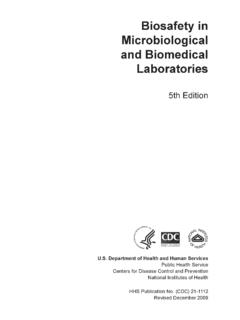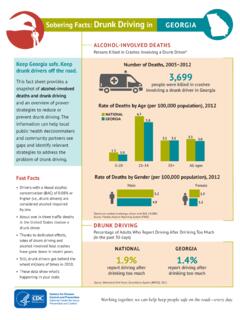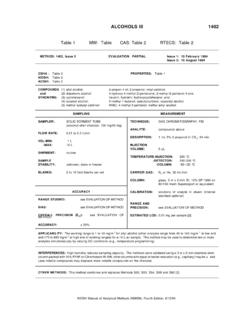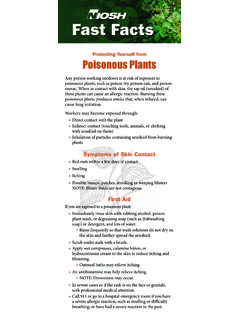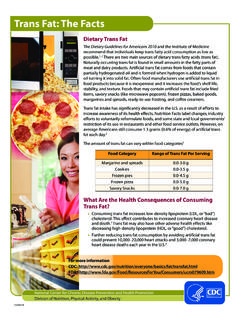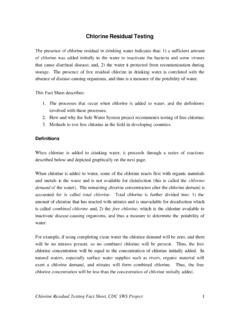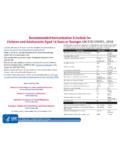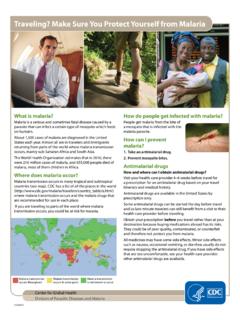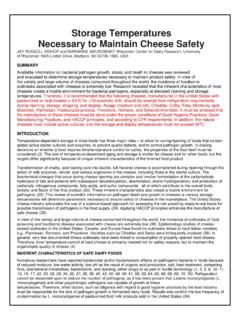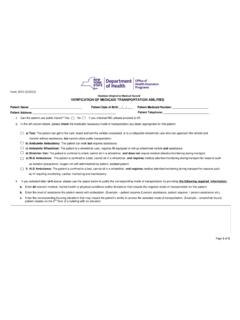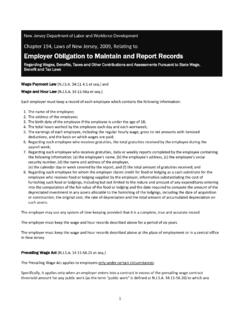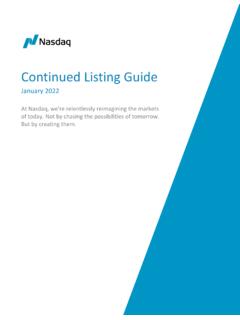Transcription of Preventing Relapse. Lifestyle Coach Facilitation Guide ...
1 Lifestyle Coach Facilitation Guide : Post-Core Preventing Relapse Content Overview This session emphasizes that a lapse is a small, temporary slip in weight loss efforts, while a relapse is a return to previous habits that is associated with weight gain. This session explains the chain of events that can lead to relapse, and highlights strategies for keeping a lapse from progressing to relapse. Participants learn to recognize high-risk situations and learn to plan for how to handle them and recover from a lapse, should one occur. Lifestyle Coach Preparation Checklist Post-core handouts: What is a Relapse?
2 The Relapse Chain Keeping a Lapse from Becoming a Relapse Recognizing High Risk Situations (2) Planning for Your High Risk Situation Planning for Comeback Your Comeback Plan Food and Activity Trackers Lifestyle Coach s Log Balance scale Materials Post-Core: Preventing Relapse Key messages to reinforce A lapse is a temporary and small slip in your weight loss efforts. A relapse is a return to previous eating and activity habits and is associated with significant weight regain. In order to avoid or effectively deal with lapses, it is important to identify situations that might be high-risk, and prepare a plan to deal with those situations.
3 After the session At the completion of this session, do the following: Use the Notes and Homework Page for notes and follow-up tasks. Distribute Food and Activity Trackers (4) for the following month. Lifestyle Coach Facilitation Guide : Post-Core 2 Post-Core: Preventing Relapse What is a Relapse? Ask: How many people here have lost weight before, only to gain it back? When you started the National Diabetes Prevention Program Lifestyle Intervention, did you have doubts or worries about keeping the weight off? Present: It is not uncommon for people who have lost weight to start slipping back into old behaviors and seeing their weight slowly creep up.
4 That said, just because it is not uncommon does not mean it is inevitable! We are going to spend this session talking about how weight regain happens, and how you can prevent it. Weight regain u sually starts with a lapse. A lapse might be overeating during dinner for a day or two, or skipping your physical activity for a week while you are on v acatio n. Lapses are a natural part of weight management. At some point, everyone has lapses small slips, moments, or brief periods of time when they return t o an o ld habit. A lapse is a brief and small slip in your weight loss efforts. REMEMBER that by itself, a lapse will not cause you to gain back the weight you have lost.
5 A lapse left u nchecked, however, can grow into a relapse. A relapse usually results from a series of several small lapses that snowball into a full-blown relapse. The most effective way to prevent a relapse is to identify the lapses early and deal with t hem before they turn i nto a relapse. A relapse is a return to previous eating and activity habits and is associated with significant weight regain. Lifestyle Coach Facilitation Guide : Post-Core 3 The relapse chain is a series or chain r eaction of events that can lead to a full relapse. The chain is shown here using the case of Rose, who slowly but steadily lost 19 pounds during the Lifestyle intervention over a seven-month p eriod.
6 Post-Core: Preventing Relapse The Relapse Chain Rose had adopted healthy eating habits and had made walking a regular part of her week, then the following took place: 1. High risk situation: Rose and her husband went for a long weekend at the beach. 2. No plan for the situation Rose did not plan for how she would maintain her healthy eating and physical activity habits while on vacation. 3. Small lapse occurs Rose decided on the fly that she deserved a few days without worrying about what she ate. However, when she got home she weighed herself and couldn t believe that she was two pounds heavier than when she left for her trip!
7 4. Negative thinking and no plan for lapse Rose became upset at the two pound weight gain and began feeling that there was no use trying anymore. She thought, If I can t just enjoy myself for a few days, why even bother? 5. Another relapse and no comeback plan Rose became further depressed and frustrated, and did not resume her healthy eating habits or walking routine. 6. Full relapse A week later, Rose had gained a total of five pounds and decided against going to the scheduled post-core session. Ask: What could Rose have done to break the relapse chain? Lifestyle Coach Facilitation Guide : Post-Core 4 Post-Core: Preventing Relapse Keeping a Lapse from Becoming a Relapse In order to deal most effectively with lapses, it is important to be prepared for them.
8 Present: A lapse (or a single occasion o f uncontrolled eating or not being physically active) is not likely by itself to cause you to slip bac k into old habits and regain weight. However, when people eat something they know they shouldn t or stop being active, they often have self-defeating thoughts. Step 1: The first step in dealing with lapses is to recognize that of all people trying to lose weight and be active experience lapses. Lapses can and should be useful learning experiences. Step 2: The second step is to resist the tendency to think negative thoughts. You are not a failure if you lapse you are normal! Step 3: Next, ask yourself what happened.
9 Use the chance to learn from the lapse. Was it a special occasion? If so, is it likely to happen again soon? Did you eat because of social pressure? Did you skip physical activity because you were too busy with other things, or because of work and family pressures? Review the situation and think about it neutrally. Then plan a strategy for dealing more effectively with similar situations in the future. Step 4: The fourth st ep is to regain control of your eating or physical activity at the very next opportunity. Do not tell yourself, Well, I blew it for the day, and wait until the next day to get back on track. Getting back on t rack without delay is important in Preventing lapses from becoming relapses.
10 Step 5: Talk to someone supportive. Call your Lifestyle Coach , another participant, or another friend or loved one and discuss your new strategy for handling lapses. Step 6: Finally, remember you are making life-long changes. Weight loss is a journey with lots of small decisions and choices every day that add up over time. Focus on all the positive changes you have made and realize that you can get back on track. Lifestyle Coach Facilitation Guide : Post-Core 5 Post-Core: Preventing Relapse Recognizing High-Risk Situations Present: Having completed the National Diabetes Prevention Program core sessions, you have probably already been faced with situations where you had to cope with (or think about) lapses.

